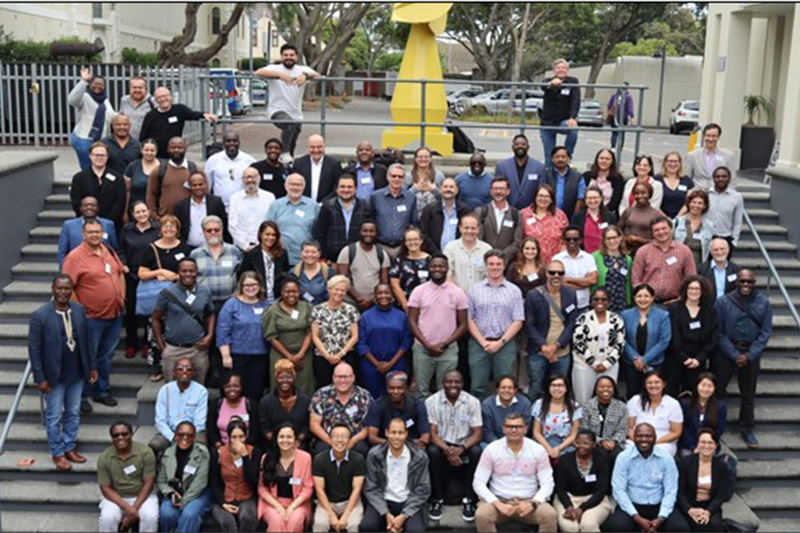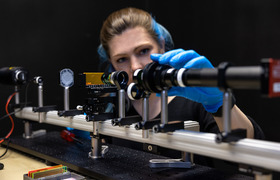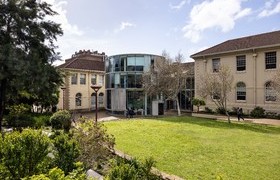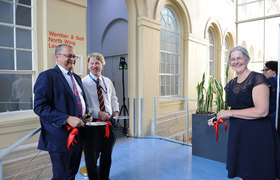African scientists launch the African Bioinformatics Institute
06 June 2025 | Story Munadia Ansarie. Photo Supplied. Read time 5 min.
A major milestone in African science recently marked by the launch of the African Bioinformatics Institute (ABI), aimed at supporting and growing the field of bioinformatics – a crucial area of science that helps researchers decode and understand complex biological data – in the continent.
Hosted in the interim at the Institute of Infectious Disease and Molecular Medicine (IDM) at the University of Cape Town (UCT) until it is established as an independent non-profit organisation (NPO), the continent-wide platform is backed by seed funding from Wellcome and the Chan Zuckerberg Initiative, the ABI will serve as a continent-wide platform to support and grow the field of bioinformatics – a crucial area of science that helps researchers decode and understand complex biological data.
Bioinformatics sits at the intersection of biology, computer science, and statistics. It helps scientists make sense of large and complex datasets, such as DNA sequences, disease outbreaks, or the evolution of viruses. This field is especially important for improving diagnostics, developing vaccines, tracking diseases, and managing biodiversity.
In Africa, bioinformatics is becoming increasingly essential as the continent generates more biological data than ever before – from pandemic surveillance to genomics and agricultural research. Yet many African researchers lack access to the tools, infrastructure, and training needed to work with this data effectively.
Meeting Africa’s needs with African leadership
The ABI was officially launched in January 2025 at a meeting of over 200 scientists, policy makers, and research leaders from across the continent and beyond. Its vision is clear: to equip African researchers and institutions with the infrastructure, skills, and networks needed to lead bioinformatics research that addresses African priorities.
Professor Nicola Mulder, interim lead of the ABI and a key driver of bioinformatics advancement at UCT, said: “The ABI is a foundational step toward building a truly Africa-led research ecosystem. Bioinformatics and data science are critical to tackling health and other development challenges on the continent.”
Building capacity, strengthening systems
The ABI will focus on four key areas:
- training and skills development for students and early-career researchers
- establishing infrastructure for data storage, analysis, and sharing
- improving pandemic preparedness with faster, locally driven disease tracking tools
- promoting One Health – linking human, animal, and environmental health.
The ABI is aligned with both the United Nations Sustainable Development Goals and the African Union’s Agenda 2063, which prioritise innovation, health, and sustainable growth across Africa.
International funders echoed the ABI’s importance, with Wellcome’s Ekin Bolukbasi saying, “Given the rapid pace of technological advancement, bioinformatics and data science have become essential to research-driven decision-making. With a huge demand for data-intensive projects across Africa, the ABI has an exciting vision to establish itself as a continent-wide skills and infrastructure hub which will catalyse the use of biological data to improve the lives of African citizens.”
Dario Taraborelli from the Chan Zuckerberg Initiative added, “Africa's leaders in genomics, biodiversity research, and disease surveillance have been working without the unified data infrastructure they deserve. We’re proud to support the African Bioinformatics Institute as it provides the data and bioinformatics backbone needed across the continent, serving the priorities of its scientific community and helping unlock breakthrough discoveries that will benefit its unique and diverse populations.”
What’s next?
The ABI recently supported the ISCB-Africa ASBCB Bioinformatics Conference in Cape Town, bringing together students, scientists, and global experts. Alongside this, the ABI has established an interim council to guide its governance structure and begin identifying future regional nodes – a key step toward ensuring both geographic reach and research diversity across the continent.
In the coming months, the ABI will roll out its first training programmes and open membership to institutions and individuals across Africa.
As the continent continues to face pressing health and environmental challenges, the ABI represents a major step toward turning African data into African solutions.
Visit the ABI website for more information.
 This work is licensed under a Creative Commons Attribution-NoDerivatives 4.0 International License.
This work is licensed under a Creative Commons Attribution-NoDerivatives 4.0 International License.
Please view the republishing articles page for more information.










